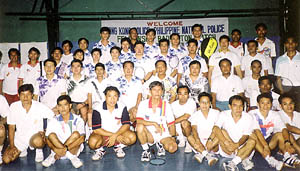



















|
|
| Coronary Heart Disease |
|
YOUNG blood vessels are flexible
and elastic, but unavoidably as one grows older ,arteries harden and thicken mainly from fats
circulated to all parts of the body through blood accumulating in the inner wall of the vessels.
Atherosclerosis, the result of this accumulation of fats, causes blood vessels to lose their
elasticity and harden and ducts to become narrower affecting normal blood supply to the brain,
heart and other parts of the body.
Information for Health is Wealth is provided by doctors and health care professionals of the Hong Kong Medical Association (co-ordinated by Administration and Support Group, Personnel Services Branch, Hong Kong Police).They look forward to receiving (and will try to answer in this Column)any questions you have on coronary heart disease. Please fax: 2865-4799. |
|
Tsang Yam-pui, DCP MAN(former chairman of the Police Badminton Club)led a delegation of police officers and members of their families to the Philippines on a four-day tour in mid-June. The delegation met the Chief of the Philippine National Police and other senior personnel at Police Headquarters in Manila. The two parties exchanged views on their work and souvenirs. On behalf of the Hong Kong contingent Mr Tsang presented a copy of the latest Hong Kong Police Review and other items to their hosts. |  Thrilla in Manila. Members of the Police Badminton Club in the Philippines |
|
The meeting was followed by a friendly badminton match between representatives of the two police forces in which the Hong Kong delegation won eight matches out of 12. In addition to Manila, Subic Bay was also included in the itinerary. The delegation was deeply impressed by, and grateful for, the superb hospitality offered by their Philippine counterparts. | |

|
SPORTING NOTES Indoor hockey training run by the Police Hockey Club well by held every Tuesday evening from 6:30pm to 8pm at the PSRC, Boundary Street. The first session starts on 7 July. All Club players and others interested in joining in are encouraged to attend. Equipment will be provided. You only need bring along a T-shirt, shorts, and non-marking training shoes. Registration for next season's Urban Council Winter Hockey League is also underway. If you would like to know more about how to join the Club contact K K Li, ADVC OPS SSDIV on 2675-3310,or Club Secretary, J M Fuller, DOO TMDIST on 2456-5375.Club members who have not received registration forms should contact the Secretary immediately. Begins 1 July to 25 August (Tuesdays from 6:30pm to 8pm at the PSRC).The eight courses, open to all serving police officers (including auxiliaries and civilians) cost $200. For more information contact S/Sgt Nelson Chiu Ho-wah:2679-2201,or 8101-1634. Events for 1998 have been finalised. If you have an interest in sailing please call to join the club. There are a number of cruising yachts owned by members and a space can normally be found. Events are: Club Regatta: The second will be held on 11 September. Macau Races: The second will be held on 6 November. Kings Cup Thailand, Phuket Island: 2-13 December. Police World Sailing Championships: Set for September 1999 in Slovenia (between Italy and Croatia). Enquiries: Alex Lau:2767-1458; Charlie Duigan:2860-5010; or Adam Creed:2860-3412. The Police Athletic Club(PAC) needs to develop potential competitors to represent the Force in the next World Police & Fire Games to be held in Stockholm in 1999.A Gidley, SIP SW, is appointed as the World Police & Fire Game(1999)Track & Field co-ordinator to nominate a list of athletes to represent the PAC. The co-ordinator is responsible to monitor the standard of performance and training of potential athletes until July 1999,and then recommend suitable competitors for the consideration of the Police Sports Council. Any full-time trained police officers who are interested in the competition may contact the chairman of the Police Athletic Club, Stuart McDouall (2814-4202), or the game co-ordinator, A Gidley(2560-3217). |

![]()
